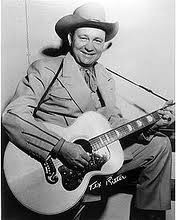They called him "America's Most Beloved Cowboy," and it wasn't all studio hype. Tex Ritter's fans adored him; his colleagues admired, respected and loved him, and the feeling was mutual.
He wouldn't leave a personal appearance until the last autograph was signed, the last snapshot taken. "The fans pay our salaries," he told his band. And he defended the boys in his band like they were members of his family. When he died of a heart attack at age 68 on Jan. 2, 1974, he was attempting to help a band member who was in trouble.
His outlook and, to a large degree, his success as an entertainer, reflected his upbringing. He was born Woodward Maurice Ritter in Panola County, Texas on Jan. 12, 1905. He was to refer to Panola County years later in his 1968 recording of Cindy Walker's "Texas". Of course, his nickname, "Tex," while not given to him until he moved to New York, reflected his roots.
Tex was a Southwestern gentleman; strong, but not afraid to be polite and kind. These personal traits, along with his distinctive, rustic, "cowboy" voice endeared him to fans and colleagues alike.
Ritter was well educated, pursuing a law dregree at the University of Texas and later, at Northwestern University, but he dropped out to join an operetta touring company. It changed his life, but the change was not overnight. His early interest in oratory, which led him to his legal studies, influenced his diction. This would pay off later on stage and screen.
And while at the University of Texas, his musical interests led him to collect a vast array of traditional cowboy songs. These songs, from his personal collection, became an important part of his repertoire in his early screen work and recording.
Ritter's theatrical interests took him to N.Y. in 1928, where he found work on radio and on Broadway. By 1933, still in N.Y., he was recording his cowboy classics (and his first releases), "Goodbye Old Paint" and "Rye Whiskey" for Art Satherly of ARC. His initial recordings didn't sell well and he didn't record again until 1935. By that time, Western music had changed dramatically, with the introduction of more romantic sounds by Gene Autry & Smiley Burnette, Bob Nolan & the Sons of the Pioneers and, importantly, Billy Hill, whose new Western compositions crossed-over to be recorded by pop singers like Bing Crosby.
The popularity of Gene Autry's films prompted the search for other singing cowboys. Tex was an obvious candidate. Presumably wise to Autry's approach, releasing music to coincide with the release of his new films, Ritter's new label, Deccca, planned to to release his 1936 recordings of "A Melody From the Sky," "The Hills of Old Wyomin'" and "We'll Rest at the End of the Trail" when his first film, SONG OF THE GRINGO, was released.
Ritter's style, in movies and on record, was sufficiently different from others in the late 30s, that he stood out. His early films were successful, but his early cowboy recordings were less so. Today, they are treasures.
In the early 40s Tex changed film companies and was teamed with "Wild Bill" Elliott in a very popular series of Westerns. At the same time, he became the first Western artist signed to Capitol Records, where he was accompanied on many sessions by legendary guitarists Merle Travis, Johnny Bond and Wesley Tuttle. Interestingly, in those early years, his hits for Capitol were in the country field, but he continued to record the occasional Western song and never lost his love for the genre.
By the early 1950s, Ritter's career was at a standstill. Then came the offer to record the soundtrack theme from HIGH NOON. The tremendous popularity of that song (two versions of which are available on the CD, HIGH NOON BCD 15634) revitalized Ritter's career. He went on to record numerous Western and country songs, and appeared frequently on the TOWN HALL PARTY tv show with Wes and Marilyn Tuttle, Johnny Bond and others. During those years, he toured extensively, often with Wes Tuttle. Wes recalls that, because of Ritter's lifelong interest in history, he always made time to stop and look at the historic site markers along the way, no matter how far behind schedule they were. Tex continued touring and recording until he passed away, his last album containing his spoken commentary about each song--a sort of historical perspective. --O.J. Sikes
| Date |
Venue |
City |
State |
Note |
| No Tour Dates Available |






 Total Reviews: 3
Total Reviews: 3













